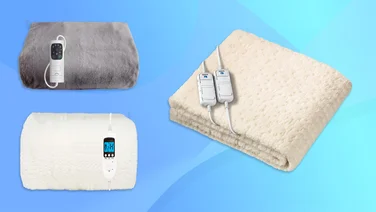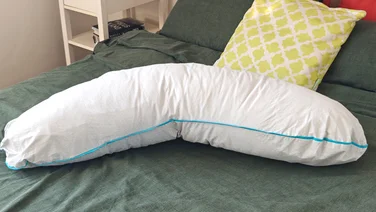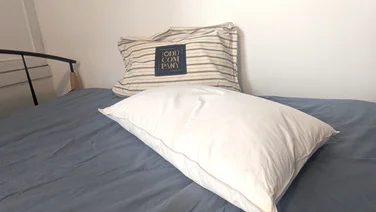To help us provide you with free impartial advice, we may earn a commission if you buy through links on our site. Learn more

When your head hits that ultra-comfortable pillow during your hotel stay, it may leave you pondering where it’s from and how you can get one.
As with most things, the main reason hotel pillows feel so nice to sleep on is because they’re made with premium materials and the best hotels will spare no expense to ensure their guests have a memorable night’s sleep.
We’ve delved into where the finest hotels source their pillows from, what’s in them, which size they use and how they keep them in tip-top shape night after night.
What brands of pillows do hotels prefer?
Hotels typically source pillows from specialist hospitality bedding suppliers known for durability, comfort and easy maintenance, according to Trish Holmes, Head of Hospitality at The Fine Bedding Company.
Well-known as an expert in hotel linens, Richard Haworth has been creating bedding for the hospitality industry since 1876 and is often a go-to brand, supplying hotels ranging from Home House to Gleneagles. Tielle is also another trusted supplier, partnering with The Savoy, The Rosewood, The Langham and Grantley Hall, among others.
In fact, Tielle has 90 years’ experience of advising on, manufacturing and supplying bedding to hotels – and has even named its products in their honour. For example, its Rosewood goose down and feather pillow is loved by London’s Rosewood Hotel and the Soho House group. Meanwhile, the Savoy pillow is its most requested hotel-quality pillow, used by Claridge’s and The Pig Hotels.

Rosewood Goose Down and Feather Pillow, Tielle
These hotel-approved goose feather pillows are made from a luxuriously high 70% goose down for softness, along with 30% goose feather for support and are rated a firm fill. They come in two sizes – standard (48 x 74cm), £175 and super king (50 x 90cm), £210.

Savoy Duck Feather and Down Pillow, Tielle
Alternatively you could opt for the more affordable Savoy pillow, which has a 70% duck feather and 30% down filling and costs £64 for a standard 48 x 74cm pillow. It also comes in square and super king sizes.
“Selected hotel chains also sell their own hotel brand pillows directly to consumers online – Marriott and Ritz-Carlton are just two hotel chains offering this option, while Premier Inn pillows can also be ordered online via the brand’s website,” explains Jonathan Attwood, co-founder at Scooms.
What sizes of pillows do hotels tend to use?
Just like at home, the most common pillow size in hotels is 50 x 75 cm (standard UK size), according to Holmes, although some luxury hotels opt for larger 50 x 90 cm pillows. The latter offers added comfort and aesthetic appeal, as it will look better on the larger king size or super king beds often found in hotel rooms. European hotels often use square (65 x 65 cm) pillows, known as European or continental pillows, which provide extra back support. Many hotels offer a combination of sizes to cater to guest preferences.
“One rule that tends to apply, whatever the size of the bed, is that the hotel should fill the width of the bed with pillows, to make it aesthetically pleasing,” explains Robert Lancaster-Gaye, co-founder of Tielle.
What materials are generally preferred for both the cover and filling?
Hotels favour pillows with durable, breathable covers, often made from high-quality cotton or cotton blends for softness and longevity, according to Holmes, while the filling choice varies based on the level of luxury and maintenance considerations.
“In terms of filling, while some hotels offer high down content pillows, 30% down and 70% feather is probably most popular pillow filling for five-star hotels. Some use 15% down 85% feather, but in all honesty, the difference is minimal – it’s all always about the quality of the down and the quality of the feather,” says Lancaster-Gaye. “The highest quality feather and down results in the best night’s sleep.”

Many of the very best hotels, including The Savoy, will present guests with a ‘pillow menu’, allowing customers to select their own fillows to suit their specific sleep requirements. “We’ve supplied all kinds of fillings to suit pillow menus, from grain, to shredded polyester,” reveals Robert Lancaster-Gaye.
Holmes and Attwood agree that premium hotels tend to favour natural down or feather fillings for a plush, high-end feel. “Down and feather filled pillows can be easily re-plumped with just a few shakes and it’s a combination that allows the pillow to gently contour to your head, while still feeling soft and springy,”says Attwood. “This provides all the support your head, neck and shoulders need to sleep comfortably throughout the night, but without leaving a permanent impression. So when the next guest checks in, the hotel pillow is like new again – perfectly fluffy-feeling and full in appearance.”
Attwood also notes that down and feather fillings are popular as they’re naturally breathable, allowing three to four times more air circulation than synthetic filled pillows, so moisture can escape more easily. “Not only is this more hygienic, it’s also perfect for keeping dust mites at bay – something that will help to prolong the life of hotel pillows, while ensuring you can breathe easily at night,” he adds.
However, some hypoallergenic synthetic alternatives, including The Fine Bedding Company’s Smartfil fibre, are increasingly popular for their performance and washability, ease of care, long lifespan and allergen-free properties.
According to hospitality expert Vanina Principi of VP7 Smart Hospitality, Claridges and The Connaught use Hungarian goose down pillows for ultimate plushness, while The Standard Hotels offer a mix of down-alternative and memory foam pillows, catering to both traditional and modern preferences.
What level of firmness do hotels prefer?
“Hotels typically offer a range of firmness levels to suit different sleeping styles, with medium-firm pillows being the most widely used as they provide balanced support for most guests,” reveals Holmes.
Lancaster-Gaye agrees that most hotels will plump for a medium support pillow to appease the majority, however he says that most hotels will also have spare firm and soft pillows on standby in case a guest can’t sleep without their pillow of choice.
As we’ve touched on already, many high-end hotels will also present guests with the pillow menu, which will allow them to not only choose their preferred filling, but also what firmness they’d like, too.

How do hotels clean and maintain their pillows?
“Hotels follow strict hygiene protocols to keep pillows fresh and in top condition,” says Holmes. “Many opt for machine-washable pillows to allow for regular laundering, ensuring cleanliness without compromising on quality.” When not taking the feather route, pillows made from quick-drying materials such as polyester and bamboo can be a boon.
Premium brand Norvegr, supplier Le Manoir and Belmond, offers a service where its pillows can be shipped back to the company and ‘restored’ once they show signs of wear – usually around five years or so. We are told Le Manoir actively takes advantage of this. The restoration can be repeated several times over, which is better for the circular economy as well as the customer’s pocket.
While feather and down pillows are naturally washable, they are more labour intensive to wash than synthetic options, and should be washed sparingly. “It’s best to use as gentle a wash cycle as possible, and you’ll need to make sure they’re properly dry to avoid mould growth,” says Lancaster-Gaye.
“Luxury hotels can’t risk staining so they use pillow protectors, usually made of densely woven, 100% cotton, to help minimise stains and prolong the life of the pillow,” continues Lancaster-Gaye. They feature a discrete zip, hidden in the seam, so after each guest, it’s simply unzipped and laundered, leaving the pillow crisp and fresh. “The pillow protector can also help to protect against dust mites, so it’s an added reassurance for those living with allergies, which can be exacerbated at night-time,” says Lancaster-Gaye. “The same benefits that five-star hotels find from pillow protectors are also true in the home.”
Richard Haworth’s range of Sleep Guard protectors, for example, are all reusable and can be washed at thermal disinfection temperature. Lastly, to keep pillows in great nick for longer, Richard Haworth recommends that both hoteliers and homeowners ‘pat’ their pillow on a daily basis to ensure the pillow loft is maintained after repeated use.
Sleep Guard Jersey Pillow Protectors, Rocard Haworth
The Jersey protector has anti-bacterial, anti-microbial and an anti-dust mite finish to provide 100% protection, plus they can even be washed at 90 degrees if required.






